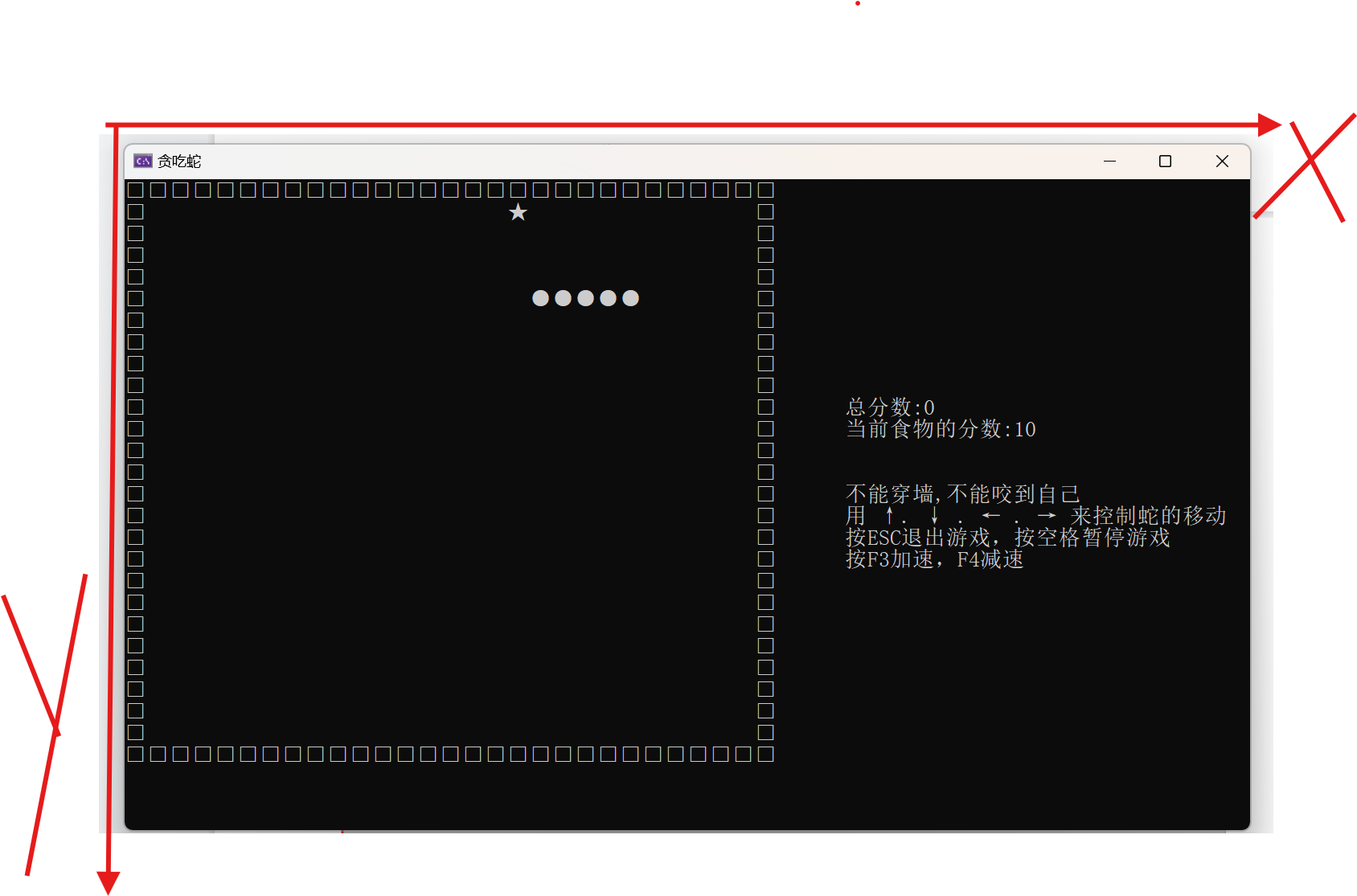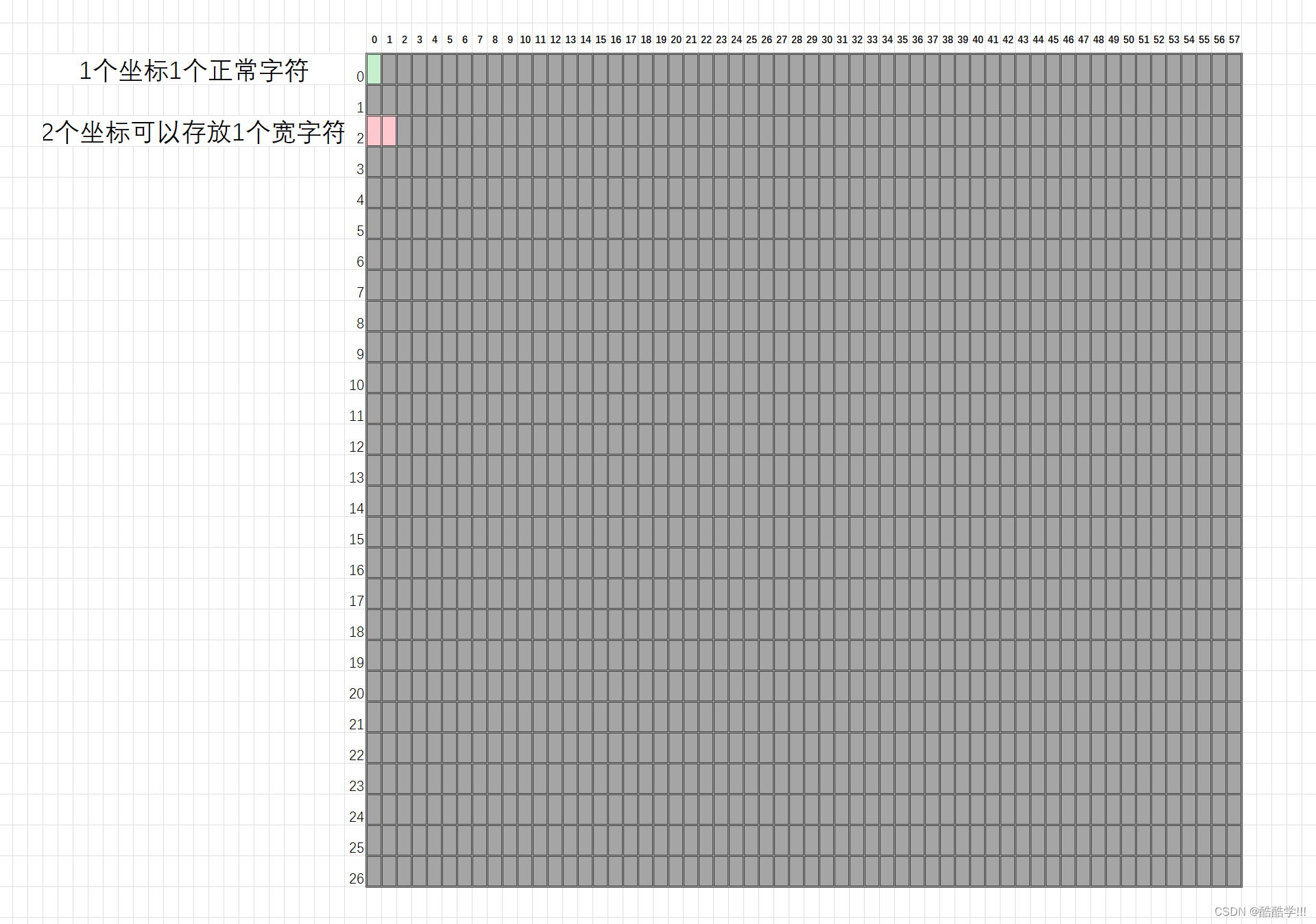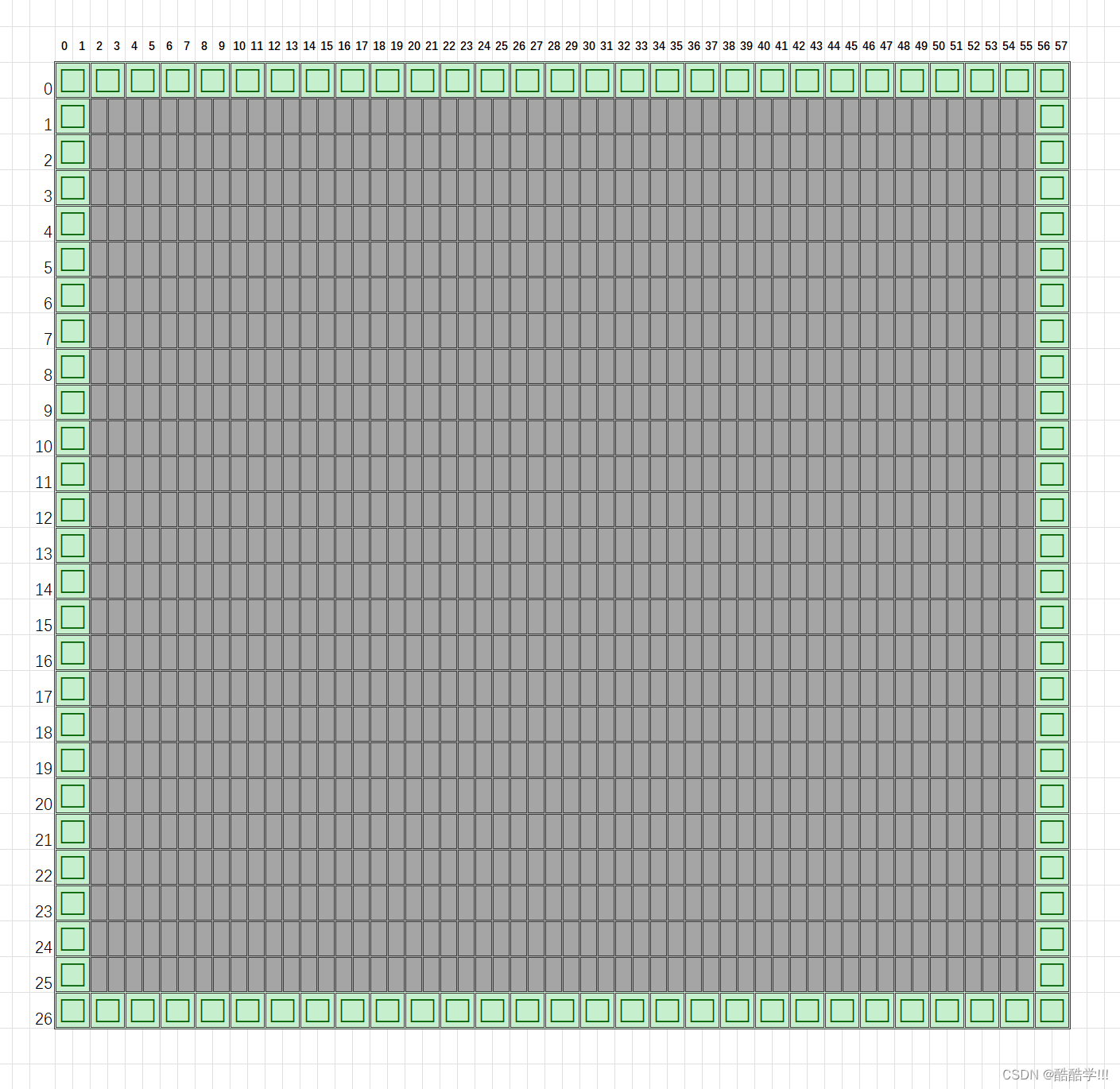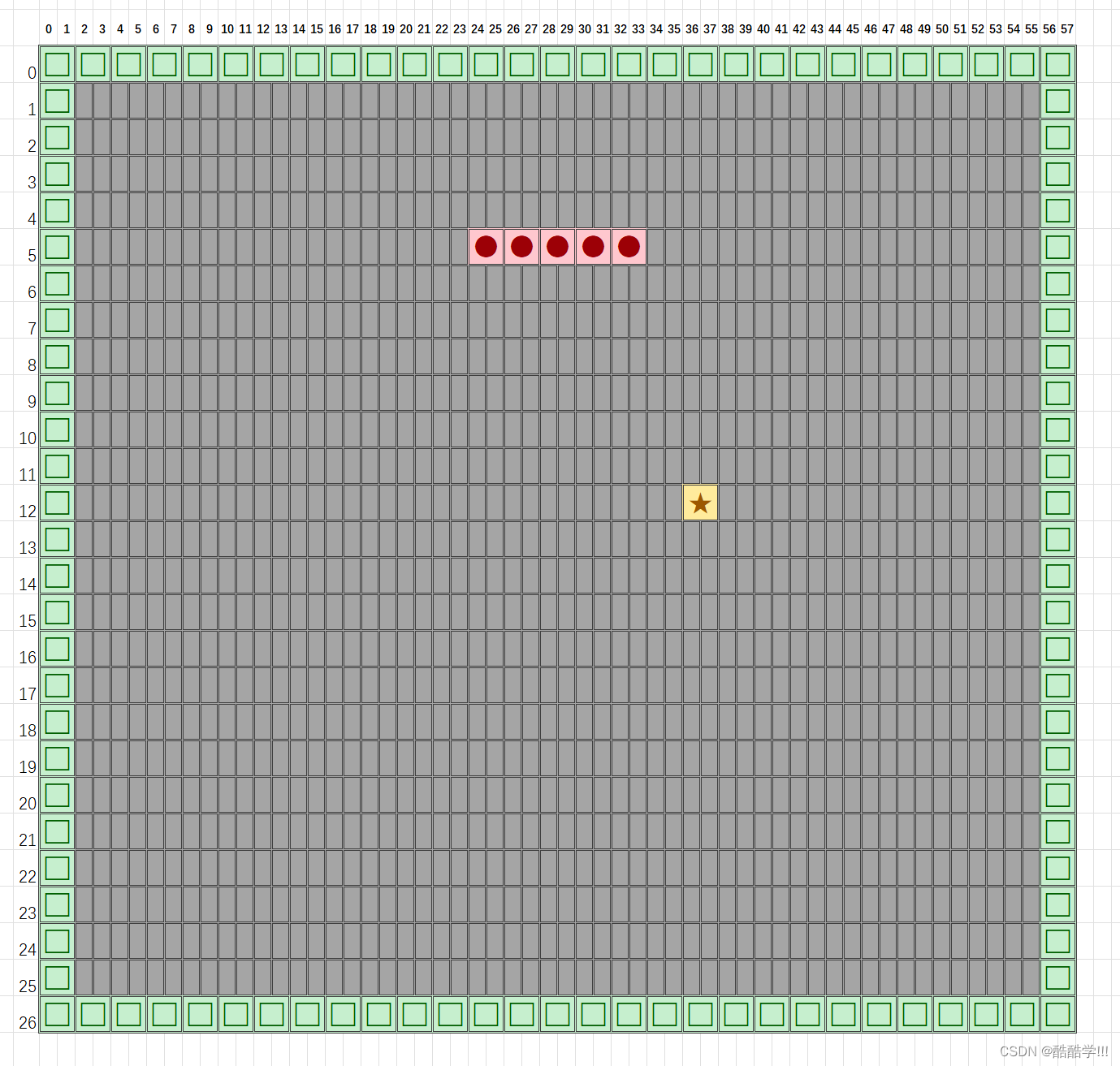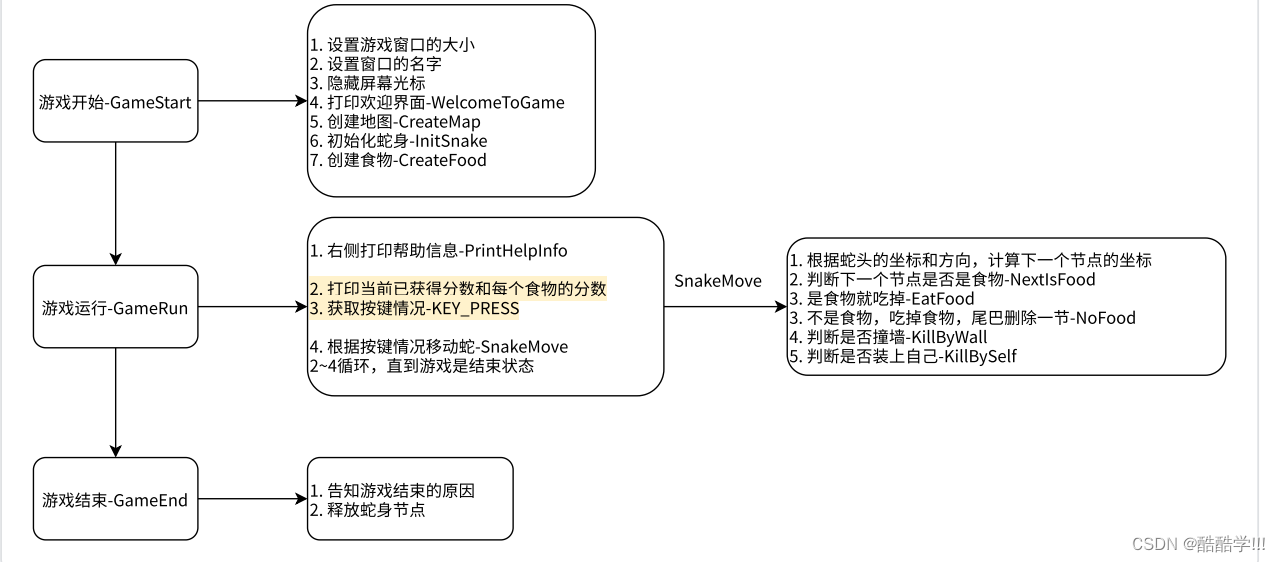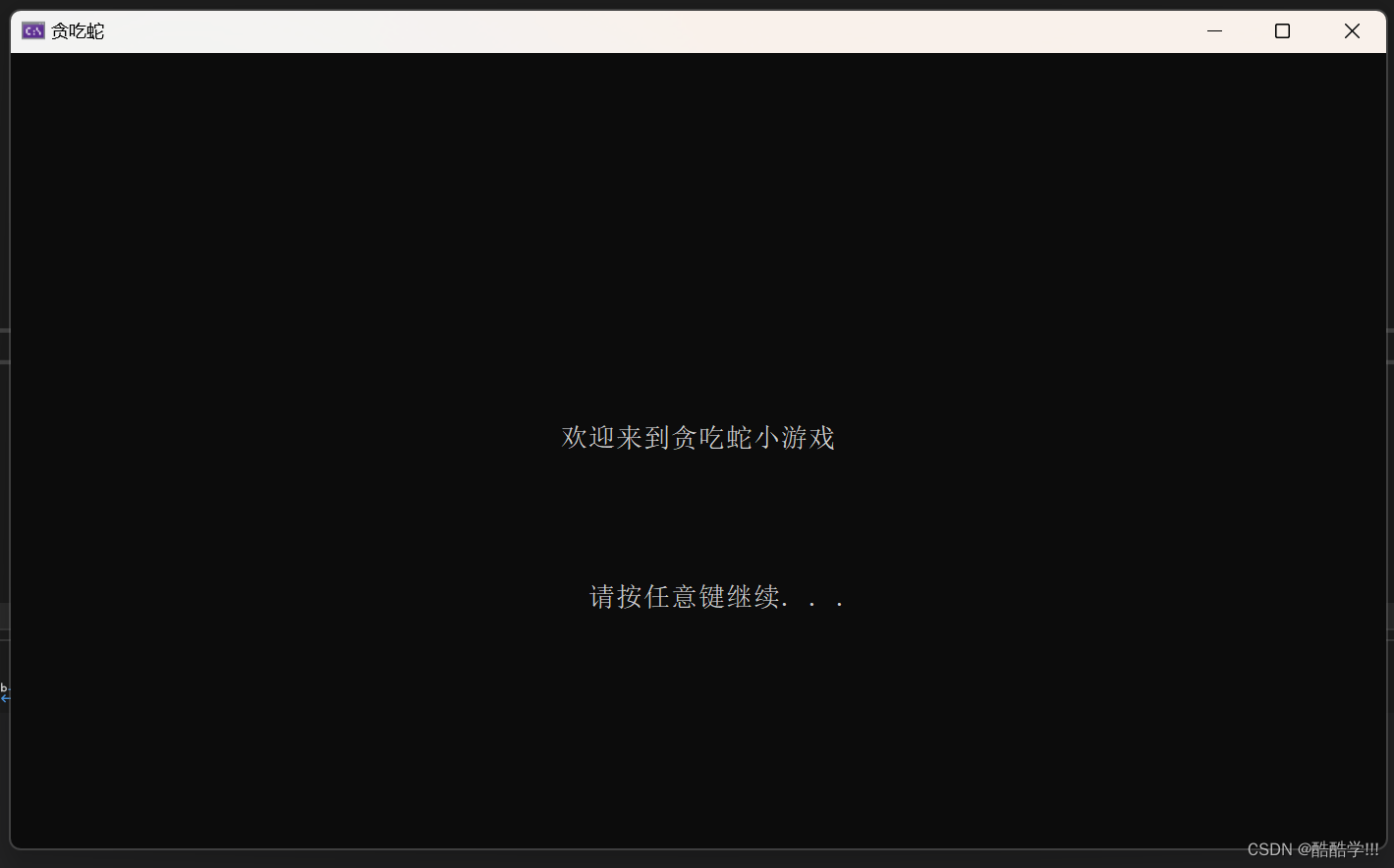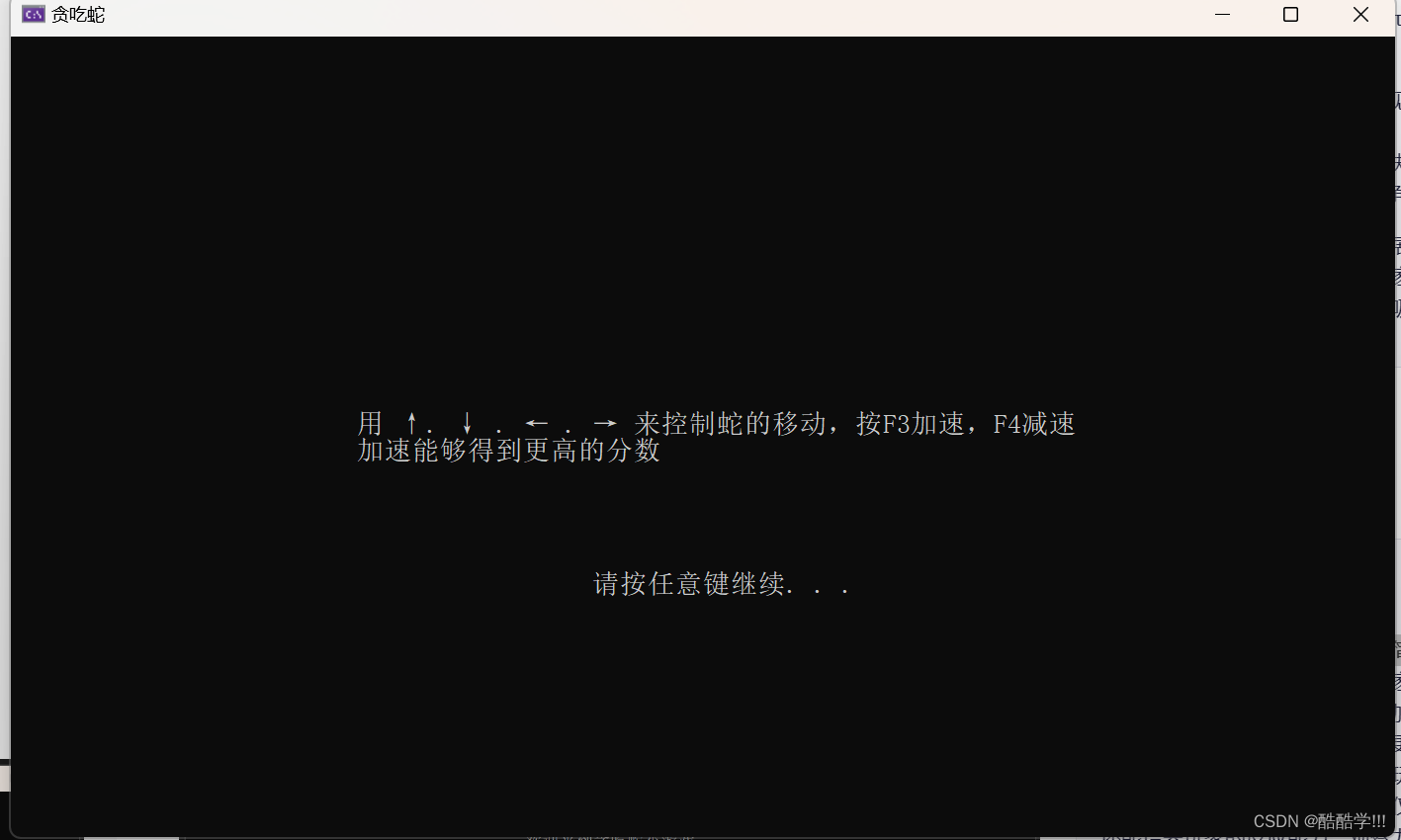目录
前言
本文旨在使用C语言和基础数据结构链表来实现贪吃蛇经典小游戏
更多精彩 点击个人主页: 酷酷学!!!
正文开始
一 . 游戏背景
1. 背景介绍
贪吃蛇是久负盛名的游戏, 它和俄罗斯方块, 扫雷等游戏位列经典游戏的行列.
在编程语言的学习中, 以贪吃蛇为例, 来提高编程能力和逻辑能力.
2. 项目目标
使用C语言在windows环境下的控制台模拟实现经典小游戏贪吃蛇
实现基本功能:
- 贪吃蛇地图绘制
- 蛇吃食物的功能(上, 下, 左, 右方向键控制蛇的动作)
- 蛇撞墙死亡
- 蛇自身死亡
- 计算得分
- 蛇身加速, 减速
- 暂停游戏
3. 技术要点
C语言函数, 枚举, 结构体, 动态内存管理, 预处理指令, 链表, Win32API等.
二 . 效果演示
三 . 游戏的设计与分析
1. 核心逻辑
- 地图:
首先控制台窗口在windows操作平台是有坐标的
x轴向右增长
y轴向下增长
需要使用后到宽字符 , 宽字符和窄字符所占的比例如下,并且需要使用setlocale函数设置本地化,并且包含对应头文件#include<locale.h>
详情点击: setlocale
我们这里可以设置为⼀个棋盘27⾏,58列的棋盘(⾏和列可以根据⾃⼰的情况修改),再围绕地图画出墙
- 蛇身和食物
初始化状态,假设蛇的长度是5,蛇身的每个节点是●,在固定的⼀个坐标处,比如(24,5)处开始出现蛇,连续5个节点。
注意:蛇的每个节点的x坐标必须是2个倍数,否则可能会出现蛇的⼀个节点有⼀半出现在墙体中,另外⼀般在墙外的现象,坐标不好对齐。
关于食物,就是在墙体内随机生成⼀个坐标(x坐标必须是2的倍数),坐标不能和蛇的⾝体重合,然后打印★。
- 数据结构设计
在游戏运行的过程中,蛇每次吃⼀个⻝物,蛇的⾝体就会变⻓⼀节,如果我们使⽤链表存储蛇的信息,那么蛇的每⼀节其实就是链表的每个节点。每个节点只要记录好蛇⾝节点在地图上的坐标就⾏,所以蛇节点结构如下:
//一个节点
typedef struct Snode
{
int x;
int y;
struct Snode* next;
}Snode ,* pSnode;
要管理整条贪吃蛇,我们再封装⼀个Snake的结构来维护整条贪吃蛇:
//蛇的维护
typedef struct Snake
{
pSnode _pSnake;//指向蛇头的指针
pSnode _pFood;//指向食物节点的指针
enum DIRECTION _dir;//蛇的方向
enum GAME_STATUS _status;//游戏的状态
int _food_weight;//一个食物的分数
int _score; //总成绩
int _sleep_time; //休息时间,时间越短,速度越快,时间越长,速度越慢
}Snake, * pSnake;
蛇的⽅向,可以⼀⼀列举,使⽤枚举
//蛇的方向
enum DIRECTION
{
UP = 1,
DOWN,
LEFT,
RIGHT
};
游戏状态,可以⼀⼀列举,使⽤枚举
enum GAME_STATUS
{
OK, //正常
KILL_BY_WALL, //撞墙
KILL_BY_SELF, //撞到自己
END_NORMAL //正常退出
};
- 流程设计
程序开始就设置程序支持本地模式,然后进⼊游戏的主逻辑。
主逻辑分为3个过程:
• 游戏开始(GameStart)完成游戏的初始化
• 游戏运行(GameRun)完成游戏运行逻辑的实现
• 游戏结束(GameEnd)完成游戏结束的说明,实现资源释放
2. 设计与分析
游戏开始Gamestart()函数
第一步:
设置在windows系统下控制台窗口大小, 使用windows的系统命令, 以及控制台窗口的名字
然后我们需要隐藏掉光标的显示, 首先使用GetStdHandle函数来获取标准输出的光标, 这里需要用到win32API的一些知识, 接着使用定义一个CONSOLE_CURSOR_INFO类型的结构体变量用来存放光标信息的, GetConsoleCursorInfo和SetConsoleCursorInfo分别是用来获取和设置光标信息的
具体了解可以点击查看官方文档:
getstdhandle
getconsolecursorinfo
setconsolecursorinfo
在游戏开始函数中我们主要需要实现初始化的功能
//1.打印环境界面
//2.功能介绍
//3.地图
//4.创建蛇
//5.创建食物
//6.设置相关属性
void gamestart(pSnake ps)
{
//设置windows下窗口大小
system("mode con cols=100 lines=30");//100列30行
system("title 贪吃蛇");
HANDLE hOutput = GetStdHandle(STD_OUTPUT_HANDLE);
CONSOLE_CURSOR_INFO info;
GetConsoleCursorInfo(hOutput, &info);
info.bVisible = false;
SetConsoleCursorInfo(hOutput, &info);
//打印环境界面和功能介绍
WelcomeToGame();
//绘制地图
CreateMap();
//创建蛇
InitSnake(ps);
//创建食物
CreateFood(ps);
}
第二步:
打印环境界面和功能介绍
游戏开始之前, 先打印环境界面和功能的介绍, 单独封装为一个函数
void WelcomeToGame()
{
SetPos(40, 14);
wprintf(L"欢迎来到贪吃蛇小游戏\n");
SetPos(42, 20);
system("pause");
system("cls");
SetPos(25, 14);
wprintf(L"用 ↑. ↓ . ← . → 来控制蛇的移动,按F3加速,F4减速\n");
SetPos(25, 15);
wprintf(L"加速能够得到更高的分数\n");
SetPos(42, 20);
system("pause");
system("cls");
}
这里我们可以把光标定位单独封装成一个函数,这也需要用到win32API提供的函数
用来设置光标位置
点击详情: setconsolecursorposition
void SetPos(short x,short y)
{
HANDLE hOutput = GetStdHandle(STD_OUTPUT_HANDLE);
COORD pos = { x,y };
SetConsoleCursorPosition(hOutput, pos);
}
第三步:
地图绘制:
主要定位光标位置
void CreateMap()
{
//27⾏,58列
//上
int i = 0;
for (i = 0; i < 29; i++)
{
wprintf(L"%lc", WALL);
}
//下
SetPos(0, 26);
for (i = 0; i < 29; i++)
{
wprintf(L"%lc", WALL);
}
//左
for (i = 1; i <= 25; i++)
{
SetPos(0, i);
wprintf(L"%lc", WALL);
}
//右
for (i = 1; i <= 25; i++)
{
SetPos(56, i);
wprintf(L"%lc", WALL);
}
//getchar();
}
第四步
蛇身的初始化, 使用链表进行初始化
蛇最开始⻓度为5节,每节对应链表的⼀个节点,蛇⾝的每⼀个节点都有⾃⼰的坐标。
创建5个节点,然后将每个节点存放在链表中进⾏管理。创建完蛇⾝后,将蛇的每⼀节打印在屏幕上。
• 蛇的初始位置从(24,5)开始。
再设置当前游戏的状态,蛇移动的速度,默认的⽅向,初始成绩,每个⻝物的分数。
• 游戏状态是:OK
• 蛇的移动速度:200毫秒
• 蛇的默认⽅向:RIGHT
• 初始成绩:0
• 每个⻝物的分数:10
void InitSnake(pSnake ps)
{
int i = 0;
pSnode cur = NULL;
for (i = 0; i < 5; i++)
{
cur = (pSnode)malloc(sizeof(Snode));
if (cur == NULL)
{
perror("InitSnake()::malloc()");
return;
}
cur->next = NULL;
cur->x = POS_X + 2 * i;
cur->y = POS_Y;
//头插法插入链表
if (ps->_pSnake == NULL) //空链表
{
ps->_pSnake = cur;
}
else //非空
{
cur->next = ps->_pSnake;
ps->_pSnake = cur;
}
}
cur = ps->_pSnake;
while (cur)
{
SetPos(cur->x, cur->y);
wprintf(L"%lc", BODY);
cur = cur->next;
}
//设置贪吃蛇的属性
ps->_dir = RIGHT;//默认向右
ps->_score = 0;
ps->_food_weight = 10;
ps->_sleep_time = 200;//单位是毫秒
ps->_status = OK;
}
第五步: 进行食物的创建,
• 先随机⽣成⻝物的坐标
◦ x坐标必须是2的倍数
◦ ⻝物的坐标不能和蛇⾝每个节点的坐标重复
• 创建⻝物节点,打印⻝物
⻝物打印的宽字符:
#define FOOD L'★'
void CreateFood(pSnake ps)
{
int x = 0;
int y = 0;
//生成x是2的倍数
//x:2~54
//y: 1~25
again:
do
{
x = rand() % 53 + 2;
y = rand() % 25 + 1;
} while (x % 2 != 0);
//x和y的坐标不能和蛇的身体坐标冲突
pSnode cur = ps->_pSnake;
while (cur)
{
if (x == cur->x && y == cur->y)
{
goto again;
}
cur = cur->next;
}
//创建食物的节点
pSnode pFood = (pSnode)malloc(sizeof(Snode));
if (pFood == NULL)
{
perror("CreateFood()::malloc()");
return;
}
pFood->x = x;
pFood->y = y;
pFood->next = NULL;
SetPos(x, y);//定位位置
wprintf(L"%lc", FOOD);
ps->_pFood = pFood;
}
游戏运行Gamerun()函数
第一步:
游戏运⾏期间,右侧打印帮助信息,提⽰玩家,坐标开始位置(64,15)
根据游戏状态检查游戏是否继续,如果是状态是OK,游戏继续,否则游戏结束。
如果游戏继续,就是检测按键情况,确定蛇下⼀步的⽅向,或者是否加速减速,是否暂停或者退出游戏。
需要的虚拟按键的罗列:
• 上:VK_UP
• 下:VK_DOWN
• 左:VK_LEFT
• 右:VK_RIGHT
• 空格:VK_SPACE
• ESC:VK_ESCAPE
• F3:VK_F3
• F4:VK_F4
确定了蛇的⽅向和速度,蛇就可以移动了。
检测按键状态,我们封装了⼀个宏
#define KEY_PRESS(VK) ((GetAsyncKeyState(VK)&0x1) ? 1 : 0)
void GameRun(pSnake ps)
{
PrintHelpInfo();
do {
SetPos(64, 10);
printf("总分数:%d\n", ps->_score);
SetPos(64, 11);
printf("当前食物的分数:%2d\n", ps->_food_weight);
if (KEY_PRESS(VK_UP) && ps->_dir != DOWN)
{
ps->_dir = UP;
}
else if (KEY_PRESS(VK_DOWN) && ps->_dir != UP)
{
ps->_dir = DOWN;
}
else if (KEY_PRESS(VK_RIGHT) && ps->_dir != LEFT)
{
ps->_dir = RIGHT;
}
else if (KEY_PRESS(VK_LEFT) && ps->_dir != RIGHT)
{
ps->_dir = LEFT;
}
else if (KEY_PRESS(VK_SPACE))
{
Pause();
}
else if (KEY_PRESS(VK_ESCAPE))
{
ps->_status = END_NORMAL;
}
else if (KEY_PRESS(VK_F3))
{
if (ps->_sleep_time > 80)
{
ps->_sleep_time -= 30;
ps->_food_weight += 2;
}
}
else if (KEY_PRESS(VK_F4))
{
if (ps->_food_weight > 2)
{
ps->_sleep_time += 30;
ps->_food_weight -= 2;
}
}
SnakeMove(ps);
Sleep(ps->_sleep_time);
} while (ps->_status == OK);
}
第二步:
打印右侧的提示信息
void PrintHelpInfo()
{
SetPos(64, 14);
wprintf(L"不能穿墙,不能咬到自己");
SetPos(64, 15);
wprintf(L"用 ↑. ↓ . ← . → 来控制蛇的移动");
SetPos(64, 16);
wprintf(L"按ESC退出游戏,按空格暂停游戏");
SetPos(64, 17);
wprintf(L"按F3加速,F4减速");
}
第三步
检测虚拟按键, 然后来修改蛇的方向
第四步: 蛇身移动SnakeMove函数
先创建下⼀个节点,根据移动⽅向和蛇头的坐标,蛇移动到下⼀个位置的坐标。
确定了下⼀个位置后,看下⼀个位置是否是⻝物(NextIsFood),是⻝物就做吃⻝物处理(EatFood),如果不是⻝物则做前进⼀步的处理(NoFood)。
蛇⾝移动后,判断此次移动是否会造成撞墙(KillByWall)或者撞上⾃⼰蛇⾝(KillBySelf),从⽽影响游戏的状态。
具体代码见四
游戏结束Gameend()函数
游戏状态不再是OK(游戏继续)的时候,要告知游戏结束的原因,并且释放蛇⾝节点。我们可以使用一个while循环来判断
具体代码见下
四 . 参考代码
snake.h
#pragma once
#include<stdio.h>
#include<time.h>
#include<stdlib.h>
#include<locale.h>
#include<Windows.h>
#include<stdbool.h>
#include<string.h>
#define POS_X 24
#define POS_Y 5
#define WALL L'□'
#define BODY L'●'
#define FOOD L'★'
//一个节点
typedef struct Snode
{
int x;
int y;
struct Snode* next;
}Snode ,* pSnode;
//蛇的方向
enum DIRECTION
{
UP = 1,
DOWN,
LEFT,
RIGHT
};
enum GAME_STATUS
{
OK, //正常
KILL_BY_WALL, //撞墙
KILL_BY_SELF, //撞到自己
END_NORMAL //正常退出
};
//蛇的维护
typedef struct Snake
{
pSnode _pSnake;//指向蛇头的指针
pSnode _pFood;//指向食物节点的指针
enum DIRECTION _dir;//蛇的方向
enum GAME_STATUS _status;//游戏的状态
int _food_weight;//一个食物的分数
int _score; //总成绩
int _sleep_time; //休息时间,时间越短,速度越快,时间越长,速度越慢
}Snake, * pSnake;
void SetPos(short x, short y);
void gamestart(pSnake ps);
void GameRun(pSnake ps);
void GameEnd(pSnake ps);
snake.c
#define _CRT_SECURE_NO_WARNINGS 1
#include"snake.h"
void SetPos(short x,short y)
{
HANDLE hOutput = GetStdHandle(STD_OUTPUT_HANDLE);
COORD pos = { x,y };
SetConsoleCursorPosition(hOutput, pos);
}
void WelcomeToGame()
{
SetPos(40, 14);
wprintf(L"欢迎来到贪吃蛇小游戏\n");
SetPos(42, 20);
system("pause");
system("cls");
SetPos(25, 14);
wprintf(L"用 ↑. ↓ . ← . → 来控制蛇的移动,按F3加速,F4减速\n");
SetPos(25, 15);
wprintf(L"加速能够得到更高的分数\n");
SetPos(42, 20);
system("pause");
system("cls");
}
void CreateMap()
{
//27⾏,58列
//上
int i = 0;
for (i = 0; i < 29; i++)
{
wprintf(L"%lc", WALL);
}
//下
SetPos(0, 26);
for (i = 0; i < 29; i++)
{
wprintf(L"%lc", WALL);
}
//左
for (i = 1; i <= 25; i++)
{
SetPos(0, i);
wprintf(L"%lc", WALL);
}
//右
for (i = 1; i <= 25; i++)
{
SetPos(56, i);
wprintf(L"%lc", WALL);
}
//getchar();
}
void InitSnake(pSnake ps)
{
int i = 0;
pSnode cur = NULL;
for (i = 0; i < 5; i++)
{
cur = (pSnode)malloc(sizeof(Snode));
if (cur == NULL)
{
perror("InitSnake()::malloc()");
return;
}
cur->next = NULL;
cur->x = POS_X + 2 * i;
cur->y = POS_Y;
//头插法插入链表
if (ps->_pSnake == NULL) //空链表
{
ps->_pSnake = cur;
}
else //非空
{
cur->next = ps->_pSnake;
ps->_pSnake = cur;
}
}
cur = ps->_pSnake;
while (cur)
{
SetPos(cur->x, cur->y);
wprintf(L"%lc", BODY);
cur = cur->next;
}
//设置贪吃蛇的属性
ps->_dir = RIGHT;//默认向右
ps->_score = 0;
ps->_food_weight = 10;
ps->_sleep_time = 200;//单位是毫秒
ps->_status = OK;
}
void CreateFood(pSnake ps)
{
int x = 0;
int y = 0;
//生成x是2的倍数
//x:2~54
//y: 1~25
again:
do
{
x = rand() % 53 + 2;
y = rand() % 25 + 1;
} while (x % 2 != 0);
//x和y的坐标不能和蛇的身体坐标冲突
pSnode cur = ps->_pSnake;
while (cur)
{
if (x == cur->x && y == cur->y)
{
goto again;
}
cur = cur->next;
}
//创建食物的节点
pSnode pFood = (pSnode)malloc(sizeof(Snode));
if (pFood == NULL)
{
perror("CreateFood()::malloc()");
return;
}
pFood->x = x;
pFood->y = y;
pFood->next = NULL;
SetPos(x, y);//定位位置
wprintf(L"%lc", FOOD);
ps->_pFood = pFood;
}
void gamestart(pSnake ps)
{
//设置windows下窗口大小
system("mode con cols=100 lines=30");//100列30行
system("title 贪吃蛇");
HANDLE hOutput = GetStdHandle(STD_OUTPUT_HANDLE);
CONSOLE_CURSOR_INFO info;
GetConsoleCursorInfo(hOutput, &info);
info.bVisible = false;
SetConsoleCursorInfo(hOutput, &info);
//打印环境界面和功能介绍
WelcomeToGame();
//绘制地图
CreateMap();
//创建蛇
InitSnake(ps);
//创建食物
CreateFood(ps);
}
void PrintHelpInfo()
{
SetPos(64, 14);
wprintf(L"不能穿墙,不能咬到自己");
SetPos(64, 15);
wprintf(L"用 ↑. ↓ . ← . → 来控制蛇的移动");
SetPos(64, 16);
wprintf(L"按ESC退出游戏,按空格暂停游戏");
SetPos(64, 17);
wprintf(L"按F3加速,F4减速");
}
#define KEY_PRESS(vk) ((GetAsyncKeyState(vk)&1)?1:0) //检测虚拟按键
void Pause()
{
while (1)
{
Sleep(200);
if (KEY_PRESS(VK_SPACE))
{
break;
}
}
}
int NextIsFood(pSnode pNext, pSnake ps)
{
return (ps->_pFood->x == pNext->x && ps->_pFood->y == pNext->y);
}
void EatFood(pSnode pn, pSnake ps)
{
//头插法
ps->_pFood->next = ps->_pSnake;
ps->_pSnake = ps->_pFood;
free(pn);
pn = NULL;
pSnode cur = ps->_pSnake;
//打印蛇
while (cur)
{
SetPos(cur->x, cur->y);
wprintf(L"%lc", BODY);
cur = cur->next;
}
ps->_score += ps->_food_weight;
//重新创建食物
CreateFood(ps);
}
void NoFood(pSnode pn, pSnake ps)
{
pn->next = ps->_pSnake;
ps->_pSnake = pn;
pSnode cur = ps->_pSnake;
while (cur->next->next != NULL)
{
SetPos(cur->x, cur->y);
wprintf(L"%lc", BODY);
cur = cur->next;
}
SetPos(cur->next->x, cur->next->y);
printf(" ");
free(cur->next);
cur->next = NULL;
}
void KillByWall(pSnake ps)
{
if (ps->_pSnake->x == 0 || ps->_pSnake->x == 56 || ps->_pSnake->y == 0
|| ps->_pSnake->y == 26)
{
ps->_status = KILL_BY_WALL;
}
}
void KillBySelf(pSnake ps)
{
pSnode cur = ps->_pSnake->next;
while (cur)
{
if (cur->x == ps->_pSnake->x && cur->y == ps->_pSnake->y)
{
ps->_status = KILL_BY_SELF;
break;
}
cur = cur->next;
}
}
void SnakeMove(pSnake ps)
{
pSnode pNext = (pSnode)malloc(sizeof(Snode));
if (pNext == NULL)
{
perror("SnakeMove()::malloc()");
return;
}
switch (ps->_dir)
{
case UP:
pNext->x = ps->_pSnake->x;
pNext->y = ps->_pSnake->y - 1;
break;
case DOWN:
pNext->x = ps->_pSnake->x;
pNext->y = ps->_pSnake->y + 1;
break;
case LEFT:
pNext->x = ps->_pSnake->x - 2;
pNext->y = ps->_pSnake->y;
break;
case RIGHT:
pNext->x = ps->_pSnake->x + 2;
pNext->y = ps->_pSnake->y;
break;
}
pNext->next = NULL;
if (NextIsFood(pNext, ps))
{
EatFood(pNext, ps);
}
else
{
NoFood(pNext, ps);
}
KillByWall(ps);
KillBySelf(ps);
}
void GameRun(pSnake ps)
{
PrintHelpInfo();
do {
SetPos(64, 10);
printf("总分数:%d\n", ps->_score);
SetPos(64, 11);
printf("当前食物的分数:%2d\n", ps->_food_weight);
if (KEY_PRESS(VK_UP) && ps->_dir != DOWN)
{
ps->_dir = UP;
}
else if (KEY_PRESS(VK_DOWN) && ps->_dir != UP)
{
ps->_dir = DOWN;
}
else if (KEY_PRESS(VK_RIGHT) && ps->_dir != LEFT)
{
ps->_dir = RIGHT;
}
else if (KEY_PRESS(VK_LEFT) && ps->_dir != RIGHT)
{
ps->_dir = LEFT;
}
else if (KEY_PRESS(VK_SPACE))
{
Pause();
}
else if (KEY_PRESS(VK_ESCAPE))
{
ps->_status = END_NORMAL;
}
else if (KEY_PRESS(VK_F3))
{
if (ps->_sleep_time > 80)
{
ps->_sleep_time -= 30;
ps->_food_weight += 2;
}
}
else if (KEY_PRESS(VK_F4))
{
if (ps->_food_weight > 2)
{
ps->_sleep_time += 30;
ps->_food_weight -= 2;
}
}
SnakeMove(ps);
Sleep(ps->_sleep_time);
} while (ps->_status == OK);
}
void GameEnd(pSnake ps)
{
SetPos(24,12);
switch (ps->_status)
{
case END_NORMAL:
printf("您主动结束游戏\n");
break;
case KILL_BY_WALL:
printf("您撞到墙上,游戏结束\n");
break;
case KILL_BY_SELF:
printf("您撞到了自己,游戏结束\n");
break;
}
pSnode cur = ps->_pSnake;
while (cur)
{
pSnode del = cur;
cur = cur->next;
free(del);
del = NULL;
}
}
test.c
#define _CRT_SECURE_NO_WARNINGS 1
#include"snake.h"
void test01()
{
int ch =0;
do {
system("cls");
Snake ps = { 0 };
gamestart(&ps);
//1.打印环境界面
//2.功能介绍
//3.地图
//4.创建蛇
//5.创建食物
//6.设置相关属性
GameRun(&ps);
//运行游戏
GameEnd(&ps);
//结束游戏
SetPos(20, 15);
printf("再来一局吗?(Y/N):");
ch = getchar();
getchar();
}while (ch == 'Y' || ch == 'y');
SetPos(0, 27);
}
int main()
{
setlocale(LC_ALL, "");
srand((unsigned int)time(NULL));
test01();
return 0;
}
五 . 总结
以上是一个简单的贪吃蛇游戏的代码总结,具体的实现方式可能会有所不同,但是核心的思路是相同的。如果对你有帮助 别忘了点赞 关注 感谢!!!
